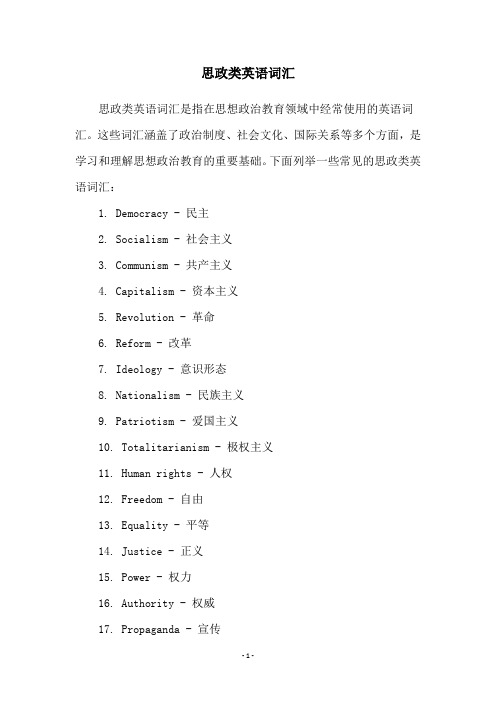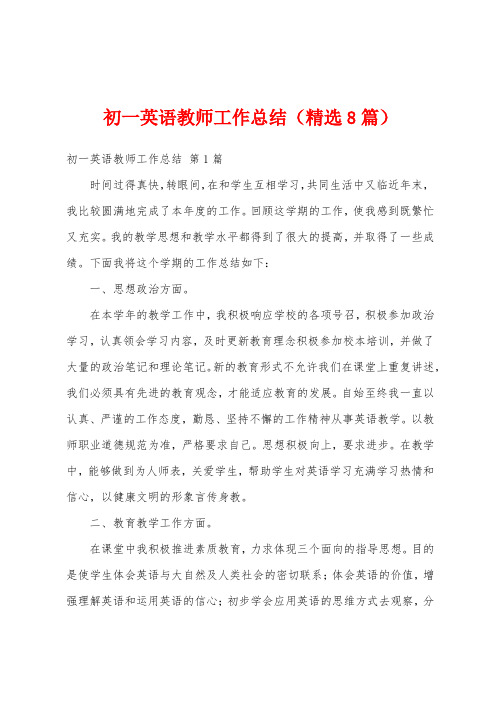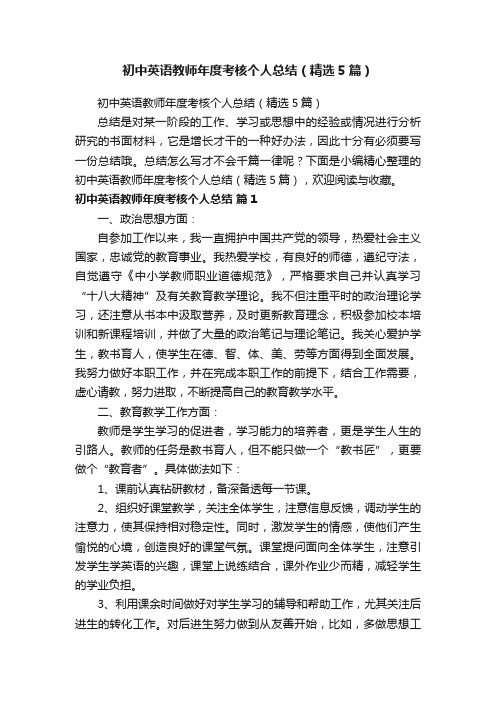英语思想政治词汇总结
中学英语教师政治思想业务工作总结_教师思想及业务工作总结

中学英语教师政治思想业务工作总结_教师思想及业务工作总结我注重提高自身的政治思想水平。
我积极参加学校组织的各种政治思想学习活动,认真学习国家政策和法律法规,提高了自己的政治理论水平。
这为我在教学中正确引导学生的思想提供了有力的支撑。
我重视对学生的政治思想教育。
在英语教学中,我注重培养学生的国际视野和国际意识,引导他们正确对待国际事务和国际关系,树立正确的国家观念和世界观。
我还注重引导学生正确对待历史和国家大事,增强他们的爱国情感和责任感。
过去一年里,我在教师思想工作上取得了一定的成绩。
但我也意识到还有很多不足之处,需要不断努力和提高。
我注重教学内容的设计和更新。
我根据学生的实际情况和学科的发展趋势,不断更新教学内容和教学方法,让学生学到真正有用的知识和技能。
我还积极参加学科培训和教研活动,努力提高自己的教学水平。
我注重学生的个性化辅导。
我在教学过程中,注重发现学生的个性特点,针对不同学生给予个性化的指导和辅导,使每一个学生都能得到良好的学习效果。
在英语学习中,我注重培养学生的语言表达能力和沟通能力,帮助他们树立自信心,积极参与课堂互动。
我注重学生的综合素质培养。
在英语教学中,我不仅注重学生的语言能力培养,还注重学生的综合素质培养,如思维能力、创新能力、合作能力等。
我努力让学生在听说读写方面全面发展,培养他们良好的学习习惯和综合素质。
三、下一步工作计划在今后的工作中,我将进一步提高政治思想和业务工作水平。
在思想工作上,我将继续加强政治思想学习,不断提高自身的政治思想水平,更好地引导学生的思想。
在业务工作上,我将继续努力提高教学水平,不断改进教学方法和手段,让学生得到更好的教育。
我将积极参与学校组织的各项工作,提高自己的综合素质。
我将加强与家长的沟通,建立良好的家校关系,形成良好的教育局面。
英语教研组工作总结15篇

英语教研组工作总结15篇英语教研组工作总结1半拉门镇中心小学高志丰光阴似箭,转眼间过了一个学期。
在这学期中,在教学工作上,面向全体学生,教书育人,为人师表。
工作责任心强,服从领导的分工,积极做好本职工作,认真备课、上课、听课、评课。
严格要求学生,尊重学生,重视激发学生的创造能力,培养学生全面发展。
一、政治思想方面:本人作为一名英语教师,在该学期中认真学习新的理论,及时更新理念,还注意从书本中汲取营养,理论联系实际,认真学习仔细体会新形势下怎样做一名好教师。
二、教学方面:在这学期中,我努力提高自己教学实践能力,增长教学经验,并成长为自己的教学理论让自己尽快成为一名成熟的研究型的小学英语教师,我主要做了下面的工作:1、课前准备:通览教材,备课深入细致;认真参阅各种资料,准确把握难重点,及时撰写教学反思,并归纳总结经验。
2、提高课堂教学效率。
我多方面地了解学生的学习方法和习惯,同时了解他们的兴趣、需要,学习新知识可能会有哪些困难,根据不同学生学习水平和能力及其特点而采取相应的预防措施,并积极调整自己的教学方法去适应学生,也让他们尽快适应我的.教学方法并尽快的帮助他们养成良好的学习习惯。
3、坚持一单元一测试的巩固训练工作,力争教学扎实有效;认真批改作业,及时了解学生的学习情况,及时给他们反馈信息,及时查漏补缺。
以便在辅导中做到有的放矢,并且通过每周3次单词的听写,掌握学生平时的学习情况,努力做到循序渐进。
而且做好后进生转化工作,实行“小组之间”互助形式,大面积,大幅度提高班级的整体成绩。
4、在每周按时检查学生的背诵情况,督促学习习惯较差的学生记单词,读熟课文,背课文。
并给予及时地评价、因为英语是一门语言技能课,只有在大量的语言输入下,才能达到良好的语言输出。
5、积极参与听课,参加教研活动,认真听取其他老师的经验及对我的公开课的评课,学习如何上好课,尽快让自己成为成熟的小学老师和如何评价一节课,虚心向同行学习教学方法,博采众长,提高教学水平。
思政类英语词汇

思政类英语词汇思政类英语词汇是指在思想政治教育领域中经常使用的英语词汇。
这些词汇涵盖了政治制度、社会文化、国际关系等多个方面,是学习和理解思想政治教育的重要基础。
下面列举一些常见的思政类英语词汇:1. Democracy - 民主2. Socialism - 社会主义3. Communism - 共产主义4. Capitalism - 资本主义5. Revolution - 革命6. Reform - 改革7. Ideology - 意识形态8. Nationalism - 民族主义9. Patriotism - 爱国主义10. Totalitarianism - 极权主义11. Human rights - 人权12. Freedom - 自由13. Equality - 平等14. Justice - 正义15. Power - 权力16. Authority - 权威17. Propaganda - 宣传18. Censorship - 审查制度19. Civil society - 公民社会20. Globalization - 全球化21. Diplomacy - 外交22. Sovereignty - 主权23. Security - 安全24. Terrorism - 恐怖主义25. Conflict - 冲突26. Peace - 和平27. Cooperation - 合作28. Development - 发展29. Modernization - 现代化30. Sustainability - 可持续性以上是一些常见的思政类英语词汇,希望能够帮助大家更好地理解和掌握思政教育相关知识。
初一英语教师工作总结(精选8篇)

初一英语教师工作总结(精选8篇)初一英语教师工作总结第1篇时间过得真快,转眼间,在和学生互相学习,共同生活中又临近年末,我比较圆满地完成了本年度的工作。
回顾这学期的工作,使我感到既繁忙又充实。
我的教学思想和教学水平都得到了很大的提高,并取得了一些成绩。
下面我将这个学期的工作总结如下:一、思想政治方面。
在本学年的教学工作中,我积极响应学校的各项号召,积极参加政治学习,认真领会学习内容,及时更新教育理念积极参加校本培训,并做了大量的政治笔记和理论笔记。
新的教育形式不允许我们在课堂上重复讲述,我们必须具有先进的教育观念,才能适应教育的发展。
自始至终我一直以认真、严谨的工作态度,勤恳、坚持不懈的工作精神从事英语教学。
以教师职业道德规范为准,严格要求自己。
思想积极向上,要求进步。
在教学中,能够做到为人师表,关爱学生,帮助学生对英语学习充满学习热情和信心,以健康文明的形象言传身教。
二、教育教学工作方面。
在课堂中我积极推进素质教育,力求体现三个面向的指导思想。
目的是使学生体会英语与大自然及人类社会的密切联系;体会英语的价值,增强理解英语和运用英语的信心;初步学会应用英语的思维方式去观察,分析,解决日常生活中的问题;形成勇于探索,勇于创新的科学精神;获得适应未来社会生活和进一步发展所必需的重要英语事实和必要的应用技能。
对教学工作我从不敢怠慢,认真学习,勤于钻研,注重在实践中积极探索新的教学方式,潜心研究英语课堂教学,深刻领会新课改的理念,注重激发和培养学生学习英语的.兴趣,自制教具,开展英语特长活动等,使学生在轻松、愉快的氛围中学习和运用语言,树立学习英语的自信心,注重形成性评价在英语教学中的运用,并能够及时总结经验,提高自己的科研水平。
由于课堂教学扎实有效,形成了独特的教学风格,多次为市英语学科做教学研究课。
在开展教研活动时,我积极出课,毫不保留,并主动带动其他英语教师成长,受到了领导的好评。
由于自己不懈地努力,加之校领导的支持与帮助上。
初中英语教师年度考核个人总结(精选5篇)

初中英语教师年度考核个人总结(精选5篇)初中英语教师年度考核个人总结(精选5篇)总结是对某一阶段的工作、学习或思想中的经验或情况进行分析研究的书面材料,它是增长才干的一种好办法,因此十分有必须要写一份总结哦。
总结怎么写才不会千篇一律呢?下面是小编精心整理的初中英语教师年度考核个人总结(精选5篇),欢迎阅读与收藏。
初中英语教师年度考核个人总结篇1一、政治思想方面:自参加工作以来,我一直拥护中国共产党的领导,热爱社会主义国家,忠诚党的教育事业。
我热爱学校,有良好的师德,遵纪守法,自觉遵守《中小学教师职业道德规范》,严格要求自己并认真学习“十八大精神”及有关教育教学理论。
我不但注重平时的政治理论学习,还注意从书本中汲取营养,及时更新教育理念,积极参加校本培训和新课程培训,并做了大量的政治笔记与理论笔记。
我关心爱护学生,教书育人,使学生在德、智、体、美、劳等方面得到全面发展。
我努力做好本职工作,并在完成本职工作的前提下,结合工作需要,虚心请教,努力进取,不断提高自己的教育教学水平。
二、教育教学工作方面:教师是学生学习的促进者,学习能力的培养者,更是学生人生的引路人。
教师的任务是教书育人,但不能只做一个“教书匠”,更要做个“教育者”。
具体做法如下:1、课前认真钻研教材,备深备透每一节课。
2、组织好课堂教学,关注全体学生,注意信息反馈,调动学生的注意力,使其保持相对稳定性。
同时,激发学生的情感,使他们产生愉悦的心境,创造良好的课堂气氛。
课堂提问面向全体学生,注意引发学生学英语的兴趣,课堂上说练结合,课外作业少而精,减轻学生的学业负担。
3、利用课余时间做好对学生学习的辅导和帮助工作,尤其关注后进生的转化工作。
对后进生努力做到从友善开始,比如,多做思想工作,从生活上关心他。
从赞美着手,所有的人都渴望得到别人的理解和尊重,所以,和差生交谈时,对他的处境、想法表示深刻的理解和尊重,还有在批评学生之前,先谈谈自己工作的不足。
办公室政治英语词汇

办公室政治英语词汇有关于办公室的英语词汇有多少呢?接下来,小编给大家准备了办公室政治英语词汇,欢迎大家参考与借鉴。
办公室政治英语词汇英:GrapevineThe process through which information gets spread unofficially throughout the company. Can be word of mouth, email, or even a hand-written piece of paper. In most companies, news, rumors2, gossip and information can spread to hundreds or thousands of employees in a very short time.Brown-nosing/kissing up/sucking upBeing overly friendly with the boss, or upper management, or anybody with some power or control, with the intent of getting favors from them, such as promotions3, raises, bonuses, etc. In many cases, it is possible that there are other employees who merit these advantages more than the brown-noser.Back-bitingMalicious4 talk that undermines someone's reputation or unfairly criticizes someone's work when they're not around.GossipLoose talk to disclose something, often of questionable5 veracity6, that is better kept to oneself. Can involve talking about an individual, a group, company issues. Can be business-related or personal.RumorsSimilar to gossip, but usually more based on some factual element or half-truth.Rumor1 mongeringSpreading a rumor with malicious intent.Peer-to-peerGossip, rumors, information-spreading, etc. that takes place among employees of the same rank.Cliques7Group of employees who stick together bound by common beliefs, interests, and/or personalities8. They are usually resistant9 to allowing outsiders in who they feel are different from them.Kiss a lot of frogsColloquial10 term used to describe an upwardly ambitious and aggressive person who wants to climb the ladder by having questionable relationships.ScandalInvolves something damaging to the company or staff that was previously11 hidden and comes to light.中:像葡萄藤般传播的传闻/小道消息信息在公司内迅速非正式传播的过程。
英语总结反思500字(精选8篇)

英语总结反思500字(精选8篇)英语总结反思500字篇1回顾这学年的工作,使我感到既繁忙又充实,特别是在校领导的领导下,我的教学思想和教学水平都得到了很大的提高,并取得了一些成绩。
下面我将这一学年的工作总结如下:一、思想政治方面在这学年的教学工作中,我自始至终以认真、严谨的工作态度,勤恳、坚持不懈的工作精神从事英语教学。
在教学中,能够做到为人师表,关爱学生,帮助学生对英语学习充满学习热情和信心。
二、业务素质方面为了适应课改的需要,我不断地钻研新的教学理念,探索新的教学方法,不断将自己的所学运用到课堂教学之中。
本人能做到每天都有积极的精神状态,让学生感受到一种积极的学习气氛。
我能遵循听说、读写跟上的教学要求,努力加大课堂训练量,加快课堂节奏,切实提高课堂教学效率。
课后坚持认真批改学生作业,发现问题及时解决。
对部分不自觉的同学还采取强硬背诵等方式,以打好他们的基础。
三、教育教学工作方面认真搞好备课,特别是集体备课教学中,备课是一个必不可少,十分重要的环节。
备课充分,能调动学生的积极性,上课效果就好。
因此,了解和分析学生情况,有针对地教对教学成功与否至关重要至关重要。
因此教学时针对不同情况,在授课时采取了不同的方法。
效果就比较理想。
以上就是我在本学年的教学工作总结。
由于经验颇浅,许多地方存在不足,希望在未来的日子里,能在各位领导老师的指导下,取得更好成绩。
英语总结反思500字篇2用英语组织教学,可以烘托英语课堂气氛,增强学生的求知欲,提高学生的听说能力。
这一环节非常重要,是学生练习听力的良好机会,也是学生学习与模仿的途径之一。
我一直坚持用英语讲课,刚开始从最简单的短语、句子、日常英语开始,然后逐步加深。
当学生听得不太懂时,我配以夸张的动作、表情或适当的解释说明,使学生沉浸在浓厚的英语气氛之中,通过英语交流,提高了学生听说能力,也无形中发展了学生运用英语进行交际的能力,培养了他们灵活运用英语的习惯。
小组教学是教学质量的保证。
英语教师政治思想工作总结简短版

英语教师政治思想工作总结简短版全文共3篇示例,供读者参考篇1Summary of Political Ideological Work of English TeachersAs English teachers, it is crucial for us to pay attention to our political ideological work in order to better educate our students and contribute to the overall development of society. Political ideological work involves instilling the correct values, beliefs, and attitudes in our students, as well as promoting a sense of patriotism and social responsibility.One of the key aspects of political ideological work for English teachers is to promote cultural understanding and diversity. We must ensure that our students have a broad view of the world and are able to appreciate different cultures and perspectives. By teaching them to respect and embrace diversity, we help build a more inclusive and tolerant society.In addition, English teachers must also play a role in promoting national unity and patriotism among students. This can be done through teaching about the history, traditions, and values of our country, and instilling a sense of pride in ourcultural heritage. By fostering a strong sense of national identity, we contribute to the overall social harmony and stability of our nation.Furthermore, as English teachers, we have the responsibility to encourage critical thinking and independent thought among our students. We must teach them to question and analyze information critically, rather than simply accepting things at face value. By promoting a culture of critical thinking, we help develop students who are able to make informed decisions and contribute meaningfully to society.Overall, political ideological work for English teachers is essential in shaping the minds and values of our students. By promoting cultural understanding, national unity, and critical thinking, we not only fulfill our role as educators, but also contribute to the overall development and progress of our society. Let us continue to uphold these values in our teaching practice and strive to make a positive impact on the future generations.篇2Political ideology work is an essential part of an English teacher's role in educating students to become well-roundedindividuals. In this summary, I will discuss the significance of integrating political ideology work into English teaching, reflect on my achievements and challenges in this aspect, and outline my future plans for enhancing political ideology work in my teaching practice.Firstly, it is important to understand the importance of incorporating political ideology work into English teaching. As English teachers, we have the responsibility to not only teach language skills but also to cultivate students' critical thinking and civic awareness. By discussing political ideologies in the classroom, we can help students develop a deeper understanding of the world around them and encourage them to become active and informed citizens. Moreover, exploring political ideologies can enhance students' language proficiency by providing them with real-world contexts for using English.In my teaching practice, I have successfully integrated political ideology work into my lessons by incorporating relevant texts, discussions, and activities. For example, I have introduced students to various political speeches, essays, and articles to help them analyze and evaluate different perspectives. I have also facilitated debates and discussions on current political issues to encourage students to voice their opinions and engage in criticalthinking. Through these activities, I have observed improvements in students' analytical skills, argumentation abilities, and overall interest in politics.However, I have also encountered challenges in implementing political ideology work in my teaching. One of the main obstacles is the diverse backgrounds and beliefs of students, which can sometimes lead to heated debates or misunderstandings. To address this challenge, I have focused on creating a safe and respectful learning environment where students feel comfortable expressing their views and listening to others. I have also emphasized the importance of empathy and open-mindedness when discussing sensitive topics to promote constructive dialogue and mutual understanding.Moving forward, I plan to further enhance political ideology work in my teaching practice by incorporating more diverse perspectives and resources. I aim to introduce students to a wider range of political ideologies, thinkers, and movements to provide them with a comprehensive understanding of political diversity. Additionally, I plan to collaborate with other teachers and experts in the field to develop interdisciplinary projects and activities that integrate language learning with political ideology work. By expanding and diversifying political ideology work inmy teaching, I hope to inspire students to engage actively in political discourse and become informed and responsible citizens.In conclusion, political ideology work plays a crucial role in English teaching by promoting critical thinking, civic awareness, and language proficiency. By integrating political ideology work into my lessons, I have seen positive outcomes in students' analytical skills and engagement with real-world issues. Despite challenges, I am committed to enhancing political ideology work in my teaching practice to empower students to become informed, critical, and open-minded individuals.篇3Title: Summary of Political Ideological Work for English TeachersAs English teachers, it is essential for us to not only impart language skills but also instill political ideology in our students. In order to achieve this, we must constantly engage in political ideological work that aligns with the values and principles of our society.First and foremost, as English teachers, we must demonstrate a strong commitment to the core socialist values ofour country. This includes promoting patriotism, collectivism, democracy, and the rule of law in our classrooms. By incorporating these values into our lessons and discussions, we can help cultivate a sense of national pride and social responsibility in our students.Moreover, as English teachers, we must be mindful of the political sensitivities and cultural nuances that exist in our society. It is important to avoid controversial topics and discussions that may incite political unrest or conflict among students. Instead, we should focus on promoting unity, harmony, and mutual understanding in our classrooms.Additionally, as English teachers, we must actively participate in political activities and events that promote socialist values and ideology. This includes attending political lectures, workshops, and conferences, as well as engaging in volunteer work and community service projects. By demonstrating our commitment to political ideology, we can serve as role models for our students and inspire them to become active and engaged citizens themselves.In conclusion, as English teachers, we play a crucial role in shaping the political ideology of our students. By promoting core socialist values, fostering unity and harmony, and activelyparticipating in political activities, we can help cultivate a generation of socially responsible and politically aware individuals. Let us continue to uphold the principles of political ideological work in our classrooms and make a positive impact on the future of our society.。
- 1、下载文档前请自行甄别文档内容的完整性,平台不提供额外的编辑、内容补充、找答案等附加服务。
- 2、"仅部分预览"的文档,不可在线预览部分如存在完整性等问题,可反馈申请退款(可完整预览的文档不适用该条件!)。
- 3、如文档侵犯您的权益,请联系客服反馈,我们会尽快为您处理(人工客服工作时间:9:00-18:30)。
英语思想政治词汇总结
思想政治是人类社会发展过程中重要的一部分,涉及到人类的思维、政治理念、价值观念等方面。
以下是一些关于思想政治的词汇总结:
1. Freedom(自由): The power or right to act, speak, or think as one wants without hindrance or restraint.
2. Democracy(民主): A system of government where power is vested in the people and exercised through elected representatives.
3. Human rights(人权): The basic rights and freedoms to which all individuals are entitled, regardless of their race, gender, religion, or other status.
4. Equality(平等): The state of being equal in status, rights, and opportunities.
5. Justice(正义): The quality of being just, fair, and impartial in the treatment of individuals and distribution of resources.
6. Liberty(自由): The state of being free from oppressive restrictions imposed by authority on one's way of life, behavior, or political views.
7. Totalitarianism(极权主义): A system of government that is centralized and dictatorial, with complete control over public and private life.
8. Authoritarianism(威权主义): A system of government characterized by strong central power and limited individual freedoms.
9. Marxism(马克思主义): A political and economic theory derived from the works of Karl Marx, advocating for the establishment of a classless society through the overthrow of the capitalist system.
10. Capitalism(资本主义): An economic system characterized by private ownership of means of production, profit motive, and competitive markets.
11. Socialism(社会主义): An economic and political system in which the means of production, distribution, and exchange are owned and regulated by the community as a whole.
12. Communism(共产主义): A political ideology advocating for the establishment of a classless, stateless society where all property is owned communally and each person contributes and receives according to their needs.
13. Nationalism(民族主义): A belief in the importance of one's own country, often accompanied by a sense of superiority over other nations.
14. Globalization(全球化): The process of increasing interconnectedness and interdependence among countries through
the exchange of goods, services, information, and ideas.
15. Liberalism(自由主义): A political ideology advocating for individual freedom, limited government intervention, and protection of civil liberties and human rights.
16. Conservatism(保守主义): A political ideology favoring tradition, limited government, and the preservation of established institutions and values.
17. Fascism(法西斯主义): A far-right political ideology characterized by dictatorial power, suppression of dissent, and extreme nationalism.
18. Terrorism(恐怖主义): The use of violence and intimidation, often targeting civilians, in pursuit of political, religious, or ideological goals.
19. Revolution(革命): A forcible overthrow of a government or social order in favor of a new system.
20. Anarchy(无政府主义): A state of society without government or law.
这些词汇提供了思想政治领域中一些基本的概念和理念,了解和掌握这些词汇可以更好地理解和分析思想政治问题。
